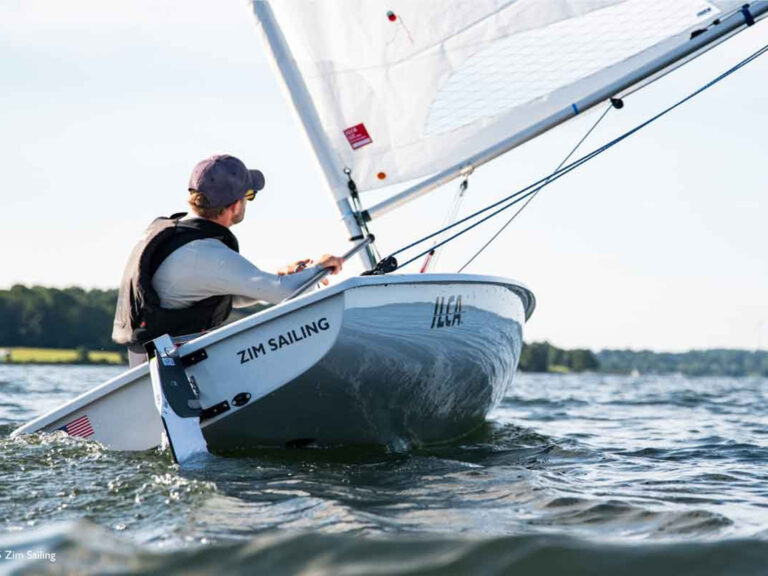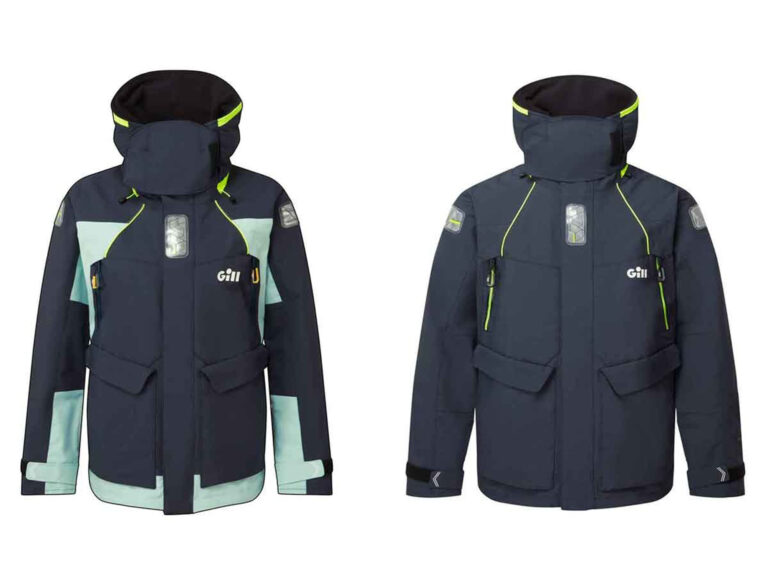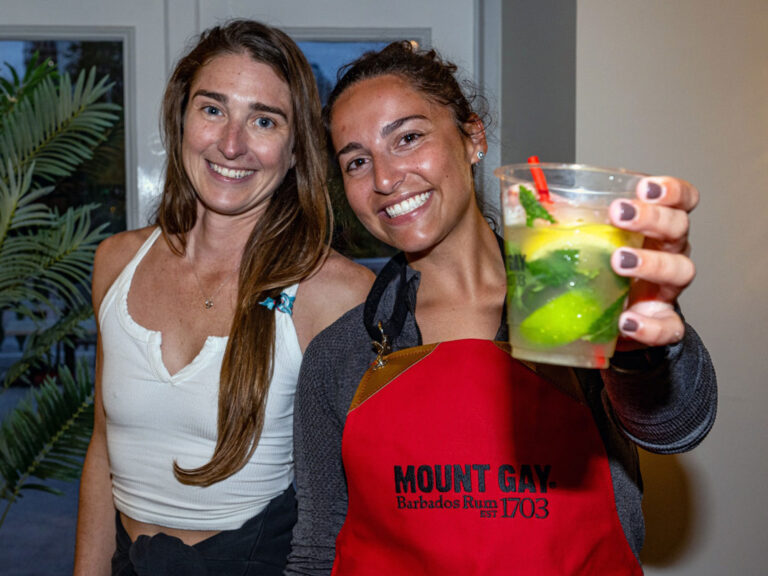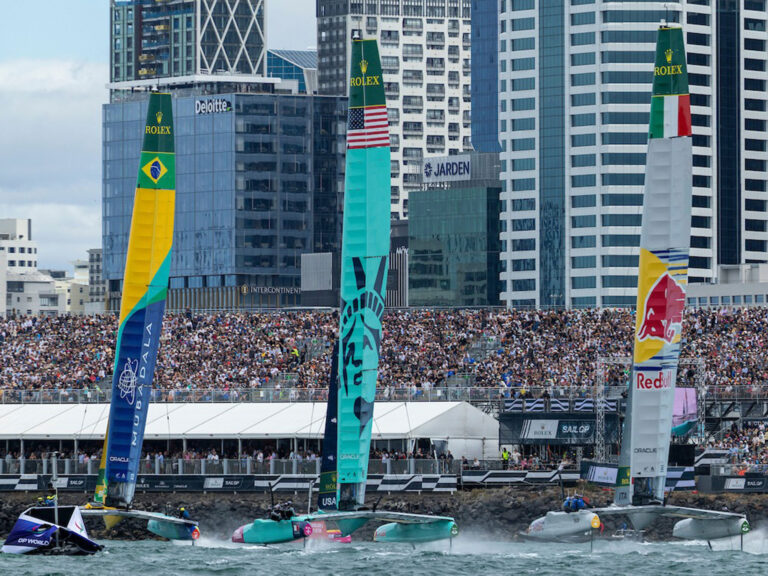Chuck and his wife, Adra, came to the forefront of international yachting in the late 1970s when Los Angeles was awarded the 84 Olympic Games, and Long Beach the sailing venue. USYRU needed someone in Southern California to coordinate the local and international personalities and politics. This job was given to Chuck who, at the time, was a USYRU Vice President. In turn, Adra took on the difficult Director of Protocol role. Their spacious Long Beach home became a “Seamens Mission” for any number of visitors from around the world — officials and competitors alike — who came to Long Beach for meetings, the Congo Cup, the pre-Olympic “OCROC” regattas of 81-83, etc.
In 1982 Charles M. Kober was tapped by USYRU to become President even though he was a relative newcomer to the organization. I then was Executive Director, and had the pleasure of working closely with Chuck. His presidency was three of the best years ever for USYRU. Chuck did a magnificent job, and was awarded the Herreshoff Trophy in 1990 for his many contributions and exemplary service to the sport.
Aside from the 1984 Olympic preparations, Chucks first big test was the 1983 Americas Cup “Keelgate.” IYRU had declined NYYCs initial challenge to the keel, saying any official communications had to come from the national authority. This put us in a tight spot, in more ways than one.
Keelgate heated up in July 1983 when Chuck and I were judging at the Pan Am Games in Venezuela. This was before cell phones, email, even fax. Our daily link to Newport was a small roadside phone booth near the regatta center. It was fully enclosed, which assured privacy from those milling about, but also meant it was a sweatbox. Chuck was not a small man. Each day, despite the equatorial heat and humidity, we crammed into the phone booth for shared-handset discussions with the USYRU office, the lawyers, and our friends at the New York Yacht Club who were pressing us to send a letter to IYRU challenging the legality of the winged keel.
We sweated it out, and finally did the right thing by sending the IYRU the letter in support of our constituent NYYC but assuring international due process. Thereafter, the IYRU chief measurer made his pivotal ruling — that Australia IIs keel was legal. Chuck then helped persuade NYYC that there should be, for the first time ever, a properly constituted International Jury for the Amercias Cup Match that September. This avoided the specter of taint, and endless appeals had the keel been protested under the racing rules.
Another test of Chucks leadership was the protracted dispute that arose from the 1984 Finn Class Olympic Trials. Chuck handled this firmly but fairly, giving all parties the chance to be heard and re-heard, gathering up his advisors and seeking their counsel, and then taking a decision and sticking with it despite tough political and legal challenges. When all was said and done this difficult decision had been affirmed by courts and arbitration panels, our Finn rep went on to win the silver medal, and Chuck saw to it that new policies and procedures were enacted to prevent similar problems in the future.
Not only did Chuck guide us through a successful 84 Olympic regatta; at the same time he made sure that USYRUs Olympic Yachting Committee had the necessary resources — while shielding Sam Merrick and Jonathan Harley from much of the usual political interference — so they could get on with producing the astonishingly good 84 USA Olympic yachting team.
Following the Olympics and his presidency, Chuck became a key North American delegate to the IYRU and a popular, globetrotting international judge. My experience is that the best judges are good sailors who, after taking up judging, continue to race actively and at a high level. This Chuck epitomized. Unlike too many judges today, Chuck never was the hyper-technical rules guy; but had a solid feeling for the game, and ability to find the facts and get at the truth. He always sought the practical, sensible “sailors” solution. Chuck became a regular invitee for world championships of Olympic and other international classes, as well as major Offshore events including the Admirals Cup.
While he was a cautious buttoned-down conservative like many of yachtings top administrators, Chuck was also a successful commercial architect with a creative bent and open mind. For example, in 1988 when the time came to push umpiring for match racing, Chuck was an early and crucial supporter, even though more than a few traditionalists viewed umpiring as a wild and crazy idea.
A nickname that stuck with Chuck was “Crow Bar.” I believe this was a Bill Bentsen invention during the 1970s when Chuck was several times an Olympic team alternate and manager, and Bill was medalling with Buddy Melges. Adra was never fond of the nickname, but Chuck took it in stride. All who knew him understood it was an ironic play on words. Chuck had a “light touch,” and was the last person you would think of using a tire iron — literally or figuratively — to achieve any purpose.
My favorite Kober story is from a mid-1980s (pre-umpiring) Congressional Cup. It was a cold and rainy day, rare for Southern California even in March. We were near the end of what had been a long week for all of us, especially the Kobers. As always they were heavily involved in the organization of the event, hosting dinners and accommodating judges and spouses in their home.
Finally finished with protests, we dashed back to the Kobers home to change for the officials dinner. We were already running late. When we parked in the rain outside Kobers, a man in black-tie met us at the curb with an umbrella. Now the Kobers are hospitable, but not flashy — so what, we wondered, was with the doorman act?
Inside we found a wedding — and not a small, informal one — about to take place in their spacious living room. Seems Adra had arrived home to find the rain was going to ruin an outdoor wedding in the adjacent park. In the midst of all else they had going on, Chuck and Adra invited them — total strangers — to move the wedding into their home.
By the time we had showered and dressed the ceremony was over, so we joined the new couple and their guests for a glass of champagne, then watched as the white trellis, chairs and other wedding regalia were quickly removed from the house. With profuse thanks, the wedding party drove off for their reception at a Long Beach hotel. We arrived at our judges dinner a bit late but with a great excuse.
We will remember Chuck and his many contributions to sailing, and especially Chuck and Adras warm and generous hospitality that has made them two of our sports best-loved people.





